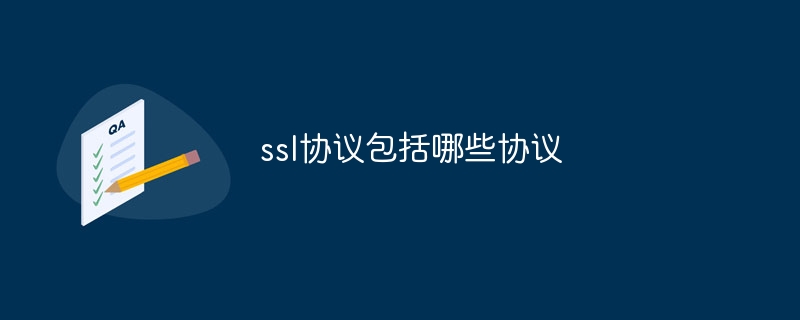Home >Common Problem >What protocols does the ssl protocol include?
ssl protocols include SLv2, Lv3, LSv1.0, Sv1.1, LSv1.2 and Sv1.3. Detailed introduction: 1. SLv2, provides data encryption and authentication functions; 2. Lv3, introduces new functions, such as key exchange algorithm and digital signature algorithm; 3. LSv1.0, provides more security and robustness encryption and authentication mechanism; 4. Sv1.1, supports new encryption algorithms and key exchange algorithms, and enhances the verification of digital certificates; 5. LSv1.2 and so on.

SSL(Secure Sockets Layer) protocol is a protocol used to protect the security of network communications. It uses encryption and authentication technology to ensure the confidentiality and integrity of data during transmission. The SSL protocol includes the following protocols:
1, SLv2 (Secure Sockets Layer version 2): SSLv2 is the earliest version of the SSL protocol, released in 1995. It uses symmetric encryption algorithms and public key encryption algorithms to provide data encryption and authentication functions. SSLv2 has been widely phased out due to multiple security vulnerabilities.
2、Lv3(Secure Sockets Layer version 3): SSLv3 is the next version of the SSL protocol, released in 1996. It fixes the security vulnerabilities of SSLv2 and introduces new features such as key exchange algorithm and digital signature algorithm. SSLv3 uses symmetric encryption algorithms and public key encryption algorithms to provide stronger security and performance.
3、LSv1.0(Transport Layer Security version 1.0): TLSv1.0 is the first version of the TLS protocol, released in 1999. It is the successor of SSLv3 and provides more secure and robust encryption and authentication mechanisms. TLSv1.0 uses symmetric encryption algorithms and public key encryption algorithms, and supports digital certificates and digital signatures.
4、Sv1.1(Transport Layer Security version 1.1): TLSv1.1 is the second version of the TLS protocol, released in 2006. It includes several improvements and fixes to TLSv1.0 to improve security and performance. TLSv1.1 supports new encryption algorithms and key exchange algorithms, and enhances the verification of digital certificates.
5、LSv1.2(Transport Layer Security version 1.2): TLSv1.2 is the third version of the TLS protocol, released in 2008. It further enhances the encryption and authentication mechanisms, supporting more secure encryption algorithms and key exchange algorithms. TLSv1.2 also introduced some new features such as block cipher suites and extension fields.
6、Sv1.3(Transport Layer Security version 1.3): TLSv1.3 is the latest version of the TLS protocol, released in 2018. It makes some improvements and simplifications based on TLSv1.2 to improve performance and security. TLSv1.3 removes some insecure encryption algorithms and protocol options, and introduces a zero-RTT handshake and a faster handshake process.
In addition to the main protocol versions listed above, the SSL protocol also includes some additional protocols and extensions, such as DTLS (Datagram Transport Layer Security) is used to protect UDP communications, the SSL/TLS handshake protocol is used to establish a secure connection, the SSL/TLS record protocol is used to transmit encrypted data, etc.
It should be noted that due to security and performance considerations, old versions of the SSL protocol (such as SSLv2 and SSLv3) have been widely eliminated. It is recommended to use newer TLS protocol versions (such as TLSv1.2 and TLSv1.3) to protect the security of network communications.
The above is the detailed content of What protocols does the ssl protocol include?. For more information, please follow other related articles on the PHP Chinese website!